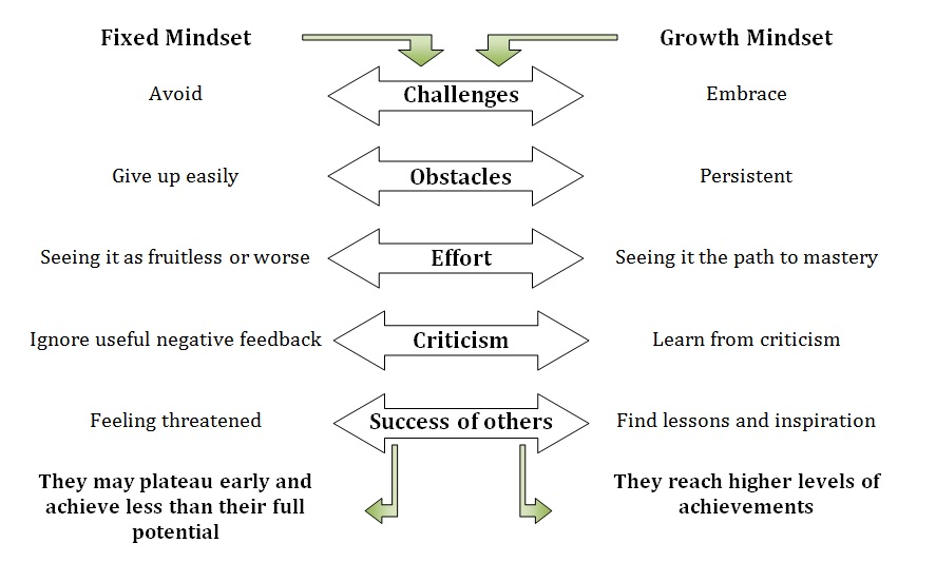
Here we are with part two of The Five Steps to Having an Empowered Mindset. If you haven’t listened to the first part yet, that’s OK; this one stands on its own (although I encourage you to go back and listen to episode 269). Today we’re going to discuss having a fixed versus a growth mindset and the tips for having a growth mindset, which will lead to feeling strong, confident and empowered.
8-minute read
Back in 2007, I read a book that changed my life. It’s called Mindset: The New Psychology of Success by psychologist Carol Dweck. She’s currently at Stanford University and is one of the world’s leading researchers on motivation and mindsets.
Her initial work was with kids, but she (and others) has since extrapolated her results to adults in their personal relationships and at work. The basic premise of her work is that there are no “naturals” or “born with it” students, athletes, artists, or people. We are “smart,” “talented,” “athletic,” and “artistic” due to our attention, consistent focus and practice. What she found is that it’s all about our mindset when we approach life, goals, relationships or challenges. She says that your mindset is a set of beliefs or a way of thinking that determines your behavior, outlook and mental attitude.
Growth vs Fixed Mindset
Dweck talks about having two basic mindsets, which she coined as fixed and growth. If you want to feel empowered, you’ve got to learn to have a growth mindset (which can definitely be cultivated if you realize you have a more fixed mindset).
Fixed Mindset
With a fixed mindset, you believe that your talents and abilities are carved in stone. You don’t want to take risks and think that putting in effort is bad (because you think things like, “Well, if I’m smart, then I shouldn’t need to study”). If you fail at something or work hard, it means you’re not smart or talented because if you were, you wouldn’t need to put in the effort.
With a fixed mindset, you want to get it perfectly, right away. And, if you don’t, you tend to give up easily. People with a fixed mindset often ignore criticism, avoid challenges and prefer easy tasks, get defensive easily and are more likely to cheat, cut corners or lie.
For these people, setbacks are traumatic. What makes it worse is that the fixed mindset gives you no way to overcome a setback. I mean, if failure means you lack competence or potential, that you are a failure, where do you go from there?
Growth Mindset
Someone with a growth mindset starts with the premise that the hand you’re dealt is just a starting point for development because everyone can change and grow through application and experience.
Growth mindset people have a passion for stretching themselves, and sticking to it, even (especially) when it’s not going well. If you have a growth mindset, you see obstacles as challenges and believe that putting in effort is a good thing. In fact, putting in effort is what makes you smart or talented. Success is in doing your best, in learning and improving and setbacks are motivating, informative, a wake-up call.
The Research
Let’s take a minute to talk about the initial research so you can really see how all this applies to you (and, if you’re a parent or planning to become one, you should really be interested).
Dweck started her work by studying the effects of praise on students at 20 NYC schools over a period of 10 years. And here’s what she did.
They went into classrooms and gave kids a simple puzzle test. They arbitrarily divided the class into two groups. In Group A kids were told their score and given one line of praise. These kids were praised for their intelligence and told things like, “You must be smart at this.”
Group B was told their score but praised for their effort and told things like, “You must have worked really hard.”
Why only one line? Dweck said that they wanted to see how sensitive the children were.
Next the students were given a choice of test. Choice #1 was a more difficult test than the first, but students were told they’d learn a lot from attempting the puzzles. Choice #2 was an easy test, much like the first one. Guess what happened? Of those initially praised for their effort, 90% chose the harder set of puzzles. Of those initially praised for their intelligence, 71% chose the easy test. In other words, the “smart” kids took the cop-out.
But why? Dweck said, “When we praise children for their intelligence, we tell them that this is the name of the game: look smart, don’t risk making mistakes and avoid the risk of embarrassment.”
Then they did another round. This time the test is two years ahead of their grade level. Of course, everyone failed. But, those praised for effort on the first test assumed they simply hadn’t focused hard enough on this test; they got very involved and tried multiple solutions. Those praised as smart, assumed their failure was evidence that they weren’t really smart at all and they were miserable.
Then it got worse. After the artificially induced “failure,” the students were given a test as easy as the very first one. The praised for their effort students significantly improved on their first score (by about 30%). However, the praised for intelligence students did worse than they had on that very first test (about 20% worse).
Dweck’s conclusion was that “Emphasizing effort gives a child a variable they can control…they come to see themselves as in control of their success…Emphasizing natural intelligence takes it out of their control, and provides no good recipe for responding to failure.”
Repeated experiments (by Dweck and others) found this effect of praise on performance held true for students of every socioeconomic class, boys, girls, ethnicity, and every age group (even preschoolers).
Benjamin Bloom, a famous educational researcher, studied 120 outstanding achievers. They were concert pianists, sculptors, Olympic swimmers, world-class tennis players, mathematicians, and research neurologists. Most weren’t that remarkable as children and didn’t show clear talent before their training began in earnest. Bloom concluded, “After 40 years of intensive research on school learning in the United States and abroad, my major conclusion is: What any person in the world can learn, almost all persons can learn, if provided with the appropriate prior and current conditions of learning.” (He didn’t count the bottom 2 or 3% with impaired learning or the highest 2 or 3% with exceptional aptitude).
There’s a famous story about how Michael Jordan was cut from his high school varsity team. He then wasn’t recruited by the college he wanted to play for (North Carolina State), and the first two NBA teams that could have chosen him didn’t draft him. He was devastated when he was cut in high school and when he complained to his mother about it, he reports that she told him to go back and discipline himself. She didn’t blame the coach or anyone else. She put the way to success squarely in his court and he credits this with much of his success and mindset when it came to basketball.
Here’s What Happens with Adults
And all of this applies to you as an adult. When you’re looking for an empowered mindset, having a growth mindset is critical because it reframes mistakes and failure as a natural part of the change and growth process. You can then perceive falling down as learning, not failing.
I teach about growth and fixed mindsets in organizations and one of my favorite stories is of a growth mindset leader named Tom Watson. Watson is famous for being the CEO of IBM and the man credited with putting them on the map. In fact, the IBM supercomputer is named Watson.
In the 1960’s, a journalist named Paul B. Carroll was interviewing Tom Watson for an upcoming article when Watson heard wind of an executive who’d made a decision that ended up losing IBM about $10 million (about $70 million now).
Carroll was allowed to say in the office when this executive was brought in and described the following interaction: He wrote, “As the executive cowered, Watson asked, “Do you know why I’ve asked you here?” The man replied, “I assume so you can fire me.”
Watson looked surprised. “Fire you?” He asked. “Of course not. I just spent $10 million educating you. I need to know what you learned.”

Growth Mindset Tips
Getting to an empowered mindset means having, on some level, a growth mindset. There are four main ways cited in the research to help you shift to a growth mindset.
- Focus on the process, not the person
- Focus on effort, not outcome
- When giving negative feedback (to yourself or others), use the word “yet,” so it gives a time perspective and a feeling of (self) efficacy.
- Give positive feedback or rewards for mistakes and thinking outside the box
I’m going to end with this quote by famous (and winning) college basketball coach John Wooden. He said, “Did I win? Did I lose? Those are the wrong questions. The correct question is: Did I make my best effort? If so, you may be outscored, but you will never lose.
Research and Resources for Having a Growth Mindset is the Key to an Empowered Mindset
Listen to Part 1! The Five Steps to Having an Empowered Mindset
Mindset: The New Psychology of Success by Carol Dweck
Billion Dollar Lessons: What You Can Learn from the Most Inexcusable Business Failures of the Last 25 Years by Paul B. Carroll and Chunka Mui






